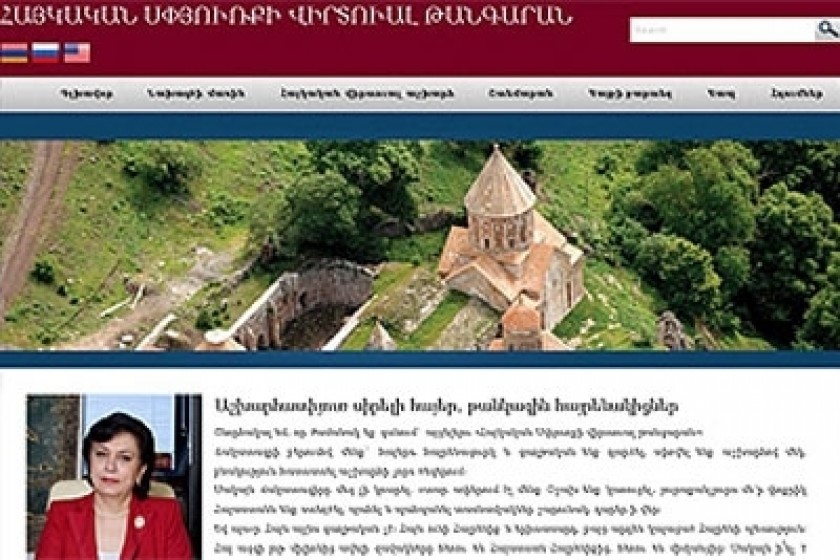
Armenian Diaspora Virtual Museum Responds to Critique: "We Need Time"
I received a reply from the editorial board of the Virtual Museum of the Armenian Diaspora regarding my critique entitled “Diaspora Ministry’s Much Heralded Virtual Museum is a Virtual Embarrassment” that appeared in the March 15 edition of Hetq.
Here’s my translation of their response:
Thanks for following the activities of the Ministry of the Diaspora and for visiting the newly launched Virtual Museum. We value each observation, opinion and constructive critique that leads to perfecting that which exists.
As to the possible inaccuracies and inadequacies in the site, we wish to stress that work is being carried out on a daily basis. We will correct each and every inaccuracy therein and improve the translation and technical capabilities. But we need time and assistance to accomplish all this. We are ready to collaborate with all who desire to work on a joint basis and can send us specific suggestions and observations.
We are certain that each project undertaken will succeed with a correct synthesis of efforts.
I am truly at a loss as to where to begin?
In essence, the Diaspora Ministry can only offer a feeble justification for their wholly inadequate effort – a project that can now be accessed by thousands via the internet.
I repeat, the Virtual Museum is indeed a “Virtual Embarrassment” that never should have been launched in its present form.
By the way, in their reply, the editorial board used the word “confusion” (shpotutyun) when translating “embarrassment”. Says quite a lot, no?
If this site is a work in progress, which even the editorial board acknowledges is riddled with inaccuracies, poor language and other thematic deficiencies, then why in God’s name did they put it on the world-wide web in the first place?
It is not merely a question of haphazard unprofessional planning and execution, but a lack of any clearly defined goal. There are countless other sites out there dealing with various aspects of the Diaspora – its history, cultural legacy, origins – that are of better quality and scope.
One would have expected the Diaspora Ministry, an arm of the RA government, to have tackled such a monumental task with a higher degree of accountability and understanding.
Armenians aren’t the only ones that will be visiting this site. We might excuse its serious shortcomings as yet another example of “business as usual”, a project of show more than substance.
I will not go into detail regarding the unacceptable translation, lack of a cohesive thematic thread regarding the Diaspora, its historical underpinnings, relations/symbiosis with the homeland, etc.
Such an analysis would require an exhaustive review regarding the purpose of such a site in the first place. Does it merely wish to serve as a compendium of dry facts and figures or does it aspire to something greater?
Suffice it to say that there is no mention, even in passing, of the Great Repatriation of the Diaspora in the 1940s, the national reawakening and liberation struggle in the Ottoman Empire of the 19th and 20th centuries, the political upheavals that shook Middle East Armenian communities in the post WWII decades, Diaspora-Armenia relations during the Soviet era...
These and other developments shaped and continue to shape the myriad diaspora realities and identities that exist today.
Evidently, the Diaspora Ministry and the Virtual Museum board are ill-equipped to broach these issues. If this is the case, then it would have been prudent not to attempt such a grandiose project from the outset.
If I may be so bold to ask – who sits on this editorial board, what are their credentials and whom, from the outside, did they sit down with for advice and overall conceptual planning.
The Ministry cannot escape accountability by saying “this is what we’ve done, good or bad” and then solicit assistance from experts and the community at large. It’s not how things are done on this scale.
Didn’t the editorial board realize that their “in-house” resources were not up to the task at hand?
The Diaspora Minister greets visitors to the site by noting: “Today, in honour of 20th anniversary of the Armenian Republic, we have created the Virtual Museum of Armenian Diaspora web-site.”
We can and must do better not only to honor this glorious anniversary but to honor the road we have travelled and survived as a nation to reach this point.
I agree with the Minister’s words, “unity is a guarantee of power and progress”. But this must be crystallized with a unity of purpose and vision.
On the eve of the 100th anniversary of the 1915 Armenian Genocide, I pray and hope that the RA government will adopt a much more fastidious, comprehensive and creative approach to public relations and perceptions.
Rest assured that there are many in Armenia and the Diaspora ready and willing to contribute to this vital effort.
 Videos
Videos Photos
Photos




Comments (4)
Write a comment